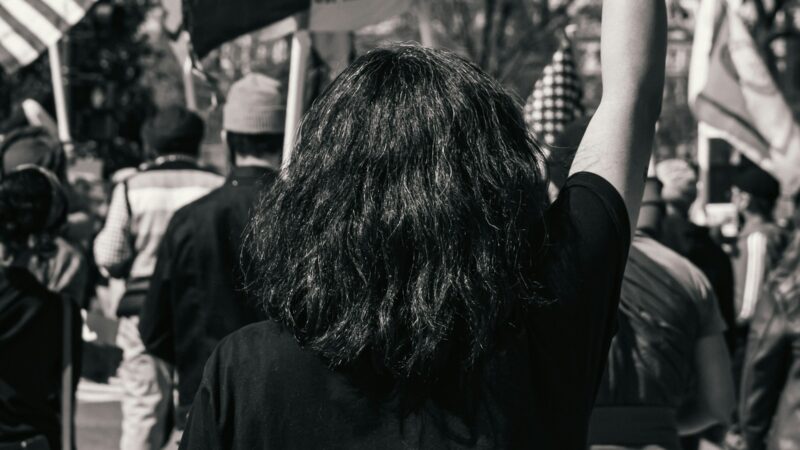A Brief History of US Student Politics
‘Hey, hey LBJ, how many kids did you kill today?’
These chants outside of the White House haunted Lyndon B. Johnson throughout his presidency. He would sit in the Oval Office with his head in his hands as the chants wafted through the walls. When his son-in-law Charles Robb sent in a tape from Vietnam, Johnson buckled against the table and looked as though he was in tears. For the loud Southern Jackson, who took great pleasure in towering over and intimidating others, this seemed like quite a big deal.
This is not about Johnson, however. This is about the students who protested him and the Vietnam War. This is about the students who protest now and any time.
An American Education
Harvard University was founded in 1636 and is classed by many as the oldest institute of higher education in the United States. Throughout history, the Ivy League colleges (Harvard, Yale, University of Pennsylvania, Princeton, Columbia, Brown, Dartmouth and Cornell) have been considered the most elite, though others have made quite the showing. Between them, the Ivy League colleges have educated fifteen US presidents. They’ve also educated many Supreme Court Justices, Governors and members of Congress.
Throughout early American history, the Ivy League and other elite colleges were almost exclusively for white, wealthy men. Colleges for women did exist, such as the female equivalent of the Ivies, the Seven Sisters, though they came far later. Colleges for African-Americans also came later, such as Howard and Tuskegee.
Cornell began to accept women in 1870, but it took until 1983 for all of them to admit women, with Columbia being the last.
Minority men were able to attend earlier and more frequently, with Yale being the last to accept black students in 1964.
Despite more diversity in terms of the student body, Ivy League colleges see students of the wealthy 1% overrepresented. One in six Ivy students have parents from the top 1%, and they are 34% more likely to be accepted than students with the same scores but from less wealthy backgrounds. The children of these parents are also more than twice as likely to attend elite universities- the Ivies, Stanford, MIT, Duke and Chicago.
The Times They Are A-Changin’
Whilst protests and activism were not unknown prior, the 1960s saw an explosion in it.
The decade was one of great social change, perhaps the greatest since the 1860s. Firstly, there was more of a focus on youth. TV, radio and movies began to cater to teenagers. Bands like the wholesome Beach Boys and sassy Beatles saw teenage screaming along. As incomes expanded, college enrollment doubled between 1945 and 1960, doubling once again by 1970.
There was also less social and cultural hegemony than before, something that Richard Nixon and his Silent Majority sought to exploit. The Civil Rights movement was at an apex as students sat at segregated café counters and took integrated buses to register African-American voters in the Deep South. Second-wave feminism saw women demand access to birth control, abortion and equality in the workplace. As students moved away from their generally conservative homes, many became embroiled in a more progressive political atmosphere.
Perhaps most impactful in terms of lives was the Vietnam War. Action in the Asian nation had significantly escalated, particularly after the Gulf of Tonkin incident in 1964.
Students in particular were opposed to the draft. College students could receive deferments, but they were in the target conscription demographic of being young and healthy and unmarried, though the marriage deferment ended in summer 1965. One of the most notable forms of protests saw students burning their draft cards.
They were also active in the protest movement as a whole. College campuses became hotbeds of political activity. Students also joined protests and demonstrations.
There were varied reasons as to why students in particular were opposed to the war. Some echoed the popular sentiment of many that it was war thousands of miles away that did not have anything to do with America. Others believed that American soldiers were killing innocent civilians. Some thought that the money would be better spent elsewhere or that war in general was wrong.
One college that became a centre of counterculture politics was UC Berkeley. The California university became a hub of activism and protests regarding Civil Rights, free speech and Vietnam.
Most of the decade saw passionate but peaceful protests in the area, but this changed. In April 1969, students at Berkeley set up an informal encampment in People’s Park, scuppering a plan to turn it into a public space. On the 15th May 1969, police arrived to turf the squatters out. This, combined with a nearby college protest, saw around 6,000 people turn out at the park. The police eventually opened fire, killing San Jose resident James Rector as he watched from the roof. Many others were injured; one man was blinded. California Governor Ronald Reagan called in the California National Guard.
There had been a notable protest at New York’s Columbia University a year before. Black student protestors had asked white protestors to protest separately, which they did, segregating it on racial lines. Some of the students occupied the administrative Hamilton Hall, holding Acting Dean Henry S. Coleman hostage.
In another protest that year, students at Morehouse in Atlanta held the board of trustees. One of those students was a young Samuel L. Jackson.
Sixties Assassinations
Adding to the students’ cynicism were the assassinations of four famous men, all of whom were generally admired by students.
The first was John F. Kennedy in November 1963. Kennedy had been a proponent of college education and had been a point of fascination for young people, mainly due to his relative youth compared to other politicians.
The second was Malcolm X, the firebrand minister for the Nation of Islam and advocate of civil rights. He was slain in February 1965.
The third was Martin Luther King Jr, the well-known minister who advocated for civil rights via peaceful means. He was killed in April 1968.
The fourth and final one was Robert Kennedy in June 1968. He had entered the Democratic race for president as an anti-war and liberal alternative to unpopular incumbent Lyndon B. Johnson.
Death At Kent State
One of the most tragic events of the student protest movement came in May 1970.
The Sixties was over and new president Richard Nixon had promised law and order. Meanwhile, America was expanding military operations in Vietnam by entering neighbouring Cambodia. This caused immediate controversy in the anti-war movement. Several hundred students at Kent State in Ohio were protesting this. Residents and police officers had been concerned about potential repercussions in the community, and the Ohio National Guard was called.
The National Guard attempted to disperse the crowd through tear gas and other means, but this failed. Protestors began to throw rocks and other projectiles at them before being herded away. Near a hill, some of the officers started to open fire. Four students- two men and two women- were killed. Nine others were wounded, one of whom was permanently paralysed.
Images of the event, including the famous picture of a horrified teenager standing over one of the bodies, caused even more riots and protests across the nation. 100,000 people marched on Washington a few days later, leading to Richard Nixon famously talking to protestors in the middle of the night at the Lincoln Memorial.
Post-Sixties
Whilst the chaos of the 1960s gave way to a relatively more peaceful 20th century, activism and protests still remained. College Democrats and College Republicans have both been popular hubs for the partisan-minded students. Politicians regularly attend speeches and rallies, especially when they’re supported by the students.
As a rule, colleges tend to be on the left of the spectrum, in both faculty and students. Exceptions to this tend to be religious institutions like Bob Jones and Liberty University.
Issues that have arisen include the Iraq War, climate change, school shootings, race, gender, sexual assault and rape and military engagement in general.
The Current Protests
On the 7th October 2023, Israel was surprised by an attack by Hamas. People were murdered, missiles were fired and civilians taken hostage. In response, Israel had gone all out on Hamas. As a result, there have been numerous deaths and injuries in Palestine. Many people have been made homeless or have needed to evacuate from their homes. Some have flooded into neighbouring Egypt. Neither Palestine or Israel are safe.
Sympathy for the deaths of innocents have been widespread, but there is a huge difference in opinion regarding Israel. Protests have happened in major cities across the world, with the pro-Palestine side occupying most of that space. London for example has seen weekly protests since October.
The issue has become a massive one in America. Historically, the American government has been a strong supporter of Israel. Joe Biden has given assistance to Israel, but seems to want incumbent Israeli PM Benjamin Netanyahu out. Internally, there is debate amongst the legislative branch. Pro-Palestine and anti-interventionist politicians have come together to stop aid to Israel. Others wish to help it more.
It’s also been dynamite for college campuses. Coast to coast, north to south, university students have been protesting non-stop since October. The Ivy League colleges have been the centre of the protests, but other elite and notable colleges such as Stanford, Berkeley, Northeastern, NYU, Ohio State, and Emerson have seen student activism.
Students have been calling for an immediate ceasefire in the area. Regarding their own colleges, they ask for the institutions to break all ties to Israel, especially regarding financial gifts.
The protests themselves have been controversial. The shouting of ‘from the river to the sea’ is seen as a call to action against Jews, as well as the calling of a global intifada. Flickers of anti-semitism have allegedly been seen in these protests, despite the bulk of participants proclaiming they oppose Zionism, not Jews. Some Jewish students have participated in the protests, whilst others feel unsafe. Classes have been called off and students have been forced to study online.
Encampments have been put up on several campuses. Some have been cleared by police whilst others remain. These encampments are made up of tents, donated food and other communal activities, all of which are subject to rules. Whilst the protests remain mainly about Israel and Palestine, they tend to bend towards anti-capitalism and progressive ideology.
New York’s Columbia University has been the establishment most in the news. On the 17th April, a number of Columbia students started an encampment. Whilst the encampment was torn down by police the next day, it was rebuilt and protests continue. Students report difficulty getting to class. Arrests and suspensions have also been made.
Student Kyhmani James became the subject of media attention following comments regarding the murder of Zionists. He filmed a video of himself talking to the administration in an attempt to get his views across. Unfortunately for Mr. James, he has been kicked out of Columbia.
The Response
America’s 1st Amendment is very strict on the freedom of speech and assembly. That being said, law enforcement and university officials are more than a little tired of it. Students have been arrested, suspended and even expelled. Three college presidents have sat before Congress- Mary Magill of UPenn, Sally Kornbluth of MIT and Claudia Gay of Harvard. Magill resigned in December 2023, and Gay followed in January 2024 after a plagiarism scandal.
Some presidents have been tough. The University of Florida sent out a very clear letter to protestors telling them which behaviour was appropriate and what would get them kicked out. Florida State turned on the sprinklers. Northeastern University got the police to clear the encampment, saying that the use of ‘Kill the Jews’ crossed the line. Florida Governor Ron DeSantis promised to expel any protestors who joined mobs. Even Columbia, the home of the most infamous protests, allowed the police in to tear down the encampment.
It doesn’t look like this is going to go away anytime soon. What some call a win for free speech is what others call going ‘too far’. As parents look away from the Ivy League to less elite but still reputable universities, one wonders if it’s a case of rich kids with too much time on their hands and no problems of their own. Is it that or a genuine example of solidarity with Palestine? Whatever the case, America’s campuses remain on metaphorical fire.




The Plastic University Bubble
I remember visiting a neighbour’s house as a child, and she had bought us an intriguing toy. ‘Super Elastic Bubble Plastic’ was its name. It was a viscous plastic material that came in a tube, along with a straw, which was used to blow it into a bubble shape (much like chewing gum). You could then throw it around and use it as a playball, and the strengthen it had through its artificiality meant it would not pop.
Our university system is much like this toy, in that it is an artificial bubble, sustained only by the will of the state managerial elite, in whose childlike hands it rests. The fundamental fact of the modern university is that it has been transformed from an institution oriented to promote the pursuit of knowledge, into a factory designed to churn out a constant supply of future managerial candidates. Such a change was an intentional act of our political class, beginning with John Major and finishing completion under Tony Blair’s New Labour.
In a debate in the House of Commons in 1983, William Waldegrave, a junior minister in Mrs Thatcher’s government told the House that “Young home entrants to university were 7.5 per cent. of the 18-year-old age group from 1978 to 1980, 7.2 per cent. in 1981 and 6.9 per cent,” and in response to criticism of university budget cuts he explained that this was to “protect the research base.” Restricting university attendance – to dare I say, an ‘elite’ few – strengthened the purpose of the university as a place of high quality research.
In contrast, John Major’s government reformed higher education with the Further and Higher Education Act 1992 leading to the proliferation in the number of universities, with 33 polytechnic colleges becoming universities and a further 45 universities being created since the Act was passed. The number of 18-year olds entering university thus skyrocketed, and Tony Blair laid out his plans to take this further, telling the Labour Party Conference in 1999 that “Today I set a target of 50% of young adults going into higher education in the next century.”
Although this is framed as an egalitarian policy intended to remove class and socioeconomic backgrounds to university attendance, such notions can be swiftly dismissed. As James Burnham, in his prescient The Managerial Revolution, tells us:
No clearer sign of this is needed than the fact that Leeds Beckett University, that bastion of quality British higher education, advises that “bachelor’s degrees in subjects such as economics, business studies or English would offer entry into generic civil servant roles.” Furthermore, a look at the government’s Civil Service Fast Track scheme shows that applicants must have only ‘achieved’ a 2:2 to apply for 11 out of the 17 scheme pathways. A 2:2 is typically a grade of 50-59%. Mediocrity is now a requirement for entry into the managerial caste. Never mind trying to achieve a first class degree and achieve something with your life; come and join the managers in Whitehall, or one of the hundreds of government quangos, is the message of Mr Blair et al.
The economics of the university system do not make sense. In the words of Shimeon Lee of the Taxpayer’s Alliance:
International students, paying tens of thousands to study in the UK, are economic tools designed to subsidise the cost for British entrants. Therefore, are simply a policy instrument used to enable as many 18-year-old Brits to go to university as possible.
Let us reflect on what this means. The managerial class, understanding that it needs a supply of fresh-faced youth to rise through its ranks with meaningless degrees in order to sustain itself, has over the past three decades opened the floodgates to millions of foreign students for no other reason than to strengthen its existence through numbers.
For those of us dissatisfied with the cultural and moral vacuum that is modern Britain, the solution is obvious. Repeal the 1992 Act, revert every post-92 university back to a polytechnic college, and abolish international student visas. Maybe then the youth of today will do something useful, rather than studying English (which we all already speak, anyway) or gender studies only to go on and work for Ofcom or Defra.
There are signs that we are heading in the right direction. Recently, Cardiff University announced that 400 academic jobs (7%) will likely be cut because of economic pressures. Revealingly, the university’s vice chancellor Wendy Larner explained this as a result of “the context of declining international student applications and increasing cost pressures, and the need to adapt to survive.” At least she was honest.
Our universities, and schools, now operate only as a training ground for future managers. Rather than keeping it artificially inflated, like a plastic child’s toy, let the bubble pop. Let the children aspire to work in business, learn a trade, or do something else that will actually benefit society.
Photo Credit.